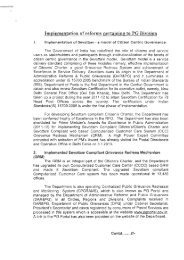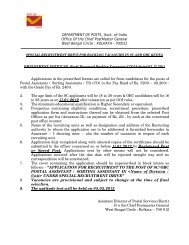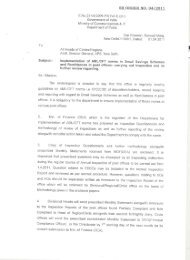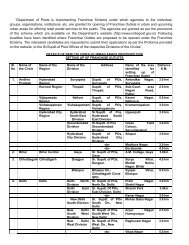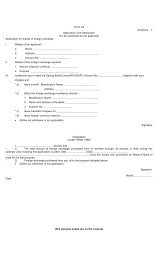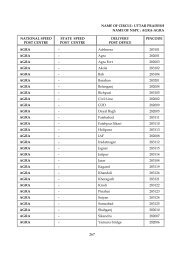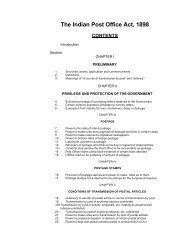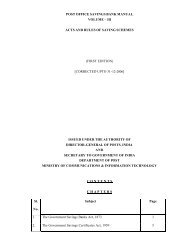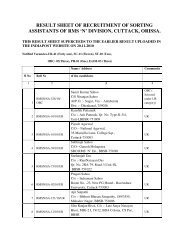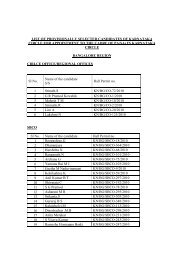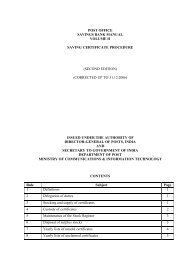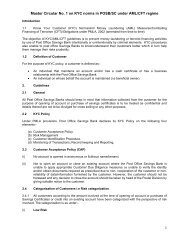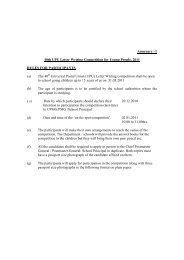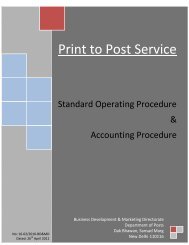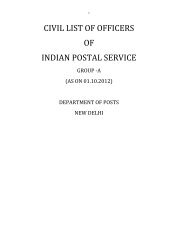Post office guide part i - India Post
Post office guide part i - India Post
Post office guide part i - India Post
Create successful ePaper yourself
Turn your PDF publications into a flip-book with our unique Google optimized e-Paper software.
44. Delivery of articles on which Customs duty is due - Articles on which customs duty<br />
to be recovered is in excess of Rs. 50 are ordinarily delivered at the post <strong>office</strong> window, except in<br />
the case of Presidency and all the post <strong>office</strong> window, except in the case of Presidency and all First<br />
Class head Offices where this limit is fixed at Rs. 100. Such duty may be paid either in cash or by<br />
cheque, the latter under the conditions laid down in clause 94.<br />
45. Delivery fee. – Small packets received from foreign countries are charged on delivery,<br />
a delivery fee at the rate as given in Part II of the P.O. Guide.<br />
46. Arrangements for delivery of over-value articles at no-delivery town post <strong>office</strong>s. –<br />
For the convenience of the public, who are required to call at the <strong>Post</strong> Office for taking delivery of<br />
over-value insured or V.P. articles, as indicated in Clauses 42 and 43 Superintendents of <strong>Post</strong><br />
Offices are authorized to empower no-delivery town post <strong>office</strong>s to deliver such articles at the<br />
window, even through they do not perform any delivery work. An indication regarding such<br />
<strong>office</strong>s will be found in the list of <strong>Post</strong> Offices in Pat III of this Guide.<br />
47. Payment of Money Orders - (1) The payment of a money order will ordinarily be<br />
made at the address of the payee on his signing the money order and acknowledgement and<br />
returning them to the postman. The coupon should be retained by the payee.<br />
(2) If the money order is payable to a person who is not permanently residing within the<br />
jurisdiction of the <strong>office</strong> of payment or personally not known to the postmaster or any of his<br />
subordinates, the money order will be paid only on satisfactory proof of the identity of the<br />
claimant with the person named in the money order.<br />
(3) Special arrangements are available at important post <strong>office</strong>s for the payment of money<br />
orders by cheque or postal pay order or by book adjustment in the case of firms, business houses,<br />
Government <strong>office</strong>s, etc., which receive a large number of Money orders or where the amount of<br />
money orders payable to a single person exceeds Rs. 100.<br />
NOTE : A payee cannot have payment of money orders both by cheque and by postal pay<br />
order.<br />
(4) A money order exceeding Rs. 500 is not normally paid by the Village <strong>Post</strong>man and the<br />
payment of such money order will be made at the window of the post <strong>office</strong> for which intimation<br />
will be sent through the Village <strong>Post</strong>man.<br />
NOTE : In certain cases money orders up to Rupees 2000 are paid by the village <strong>Post</strong>man.<br />
48. Duties of postmen and other delivery agents. - <strong>Post</strong>men and other delivery agents<br />
are forbidden to deliver any article on which any sum of money is due to the <strong>Post</strong> Office, whether<br />
on account of postage, customs duty, or on any other account without receiving immediate<br />
payment of the amount due, or to delivery any registered or insured letter or parcel without<br />
obtaining the signature of the addressee or his agent on the receipt and acknowledgement. They<br />
are also forbidden to deviate from their prescribed beats, and cannot, therefore, be required to call<br />
again to receive payment of sums due. They are not bound to give change.



